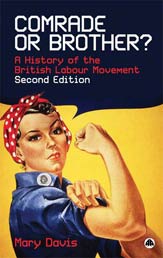Comrade or Brother? A History of the British Labour Movement
A timely overview of two centuries of British labour history carries hope for the future as well as insights on the past.
 The broad thrust of this impressive overview of 200 years of British labour history concerns the dichotomy between a rich radical socialist tradition and an equally influential reformist current. The latter tendency was perhaps best exemplified by the Labour leader Keir Hardie, who at the beginning of the 20th century identified his and the Labour Party's politics as 'labourism': a 'theory and practice which accepted the possibility of social change within the existing framework of society'.
A syndicalist pamphlet of 1912, The Miners' Next Step, presents an entirely different conception of working-class politics: 'an industrial vote will affect the lives and happiness of workmen far more than a political vote ... hence it should be more sought after and its privileges more jealously guarded.' In view of the 25th anniversary of the era-defining miners' strike of 1984-85, this revised edition is a timely release.
Davis's survey begins in the early part of the 19th century, when early union leaders realised, well before Marx, that 'political power, being based on economic wealth, could only be dislodged by workers at the point of production'. The scope for an effective mass movement was limited by divisions of skill and organisational capability, as the organised, skilled sectors pulled away from the unskilled masses, first undercutting support for Chartism and, as the years went by, forming a seemingly exclusive class of their own. Book: Comrade or Brother? A History of the British Labour Movement (by Mary Davis, Pluto Press)
Link
posted by johannes,
Friday, May 01, 2009
[The Archives]

.
.
.
.
.
|
.
.
.
|